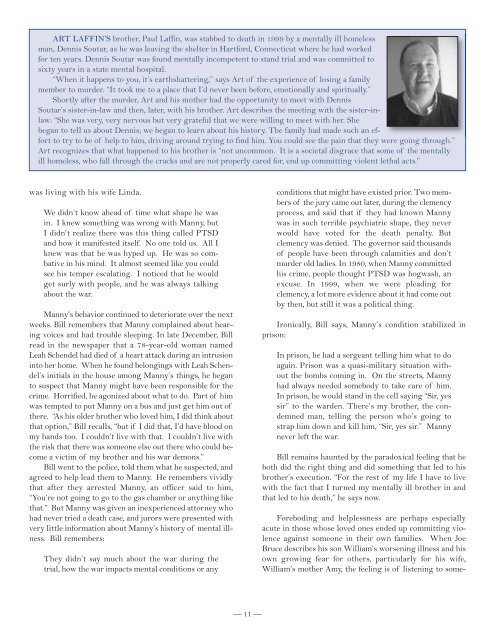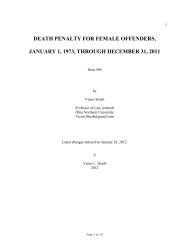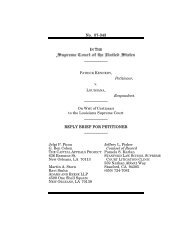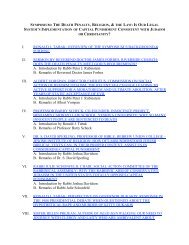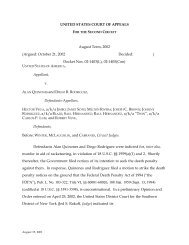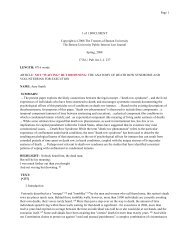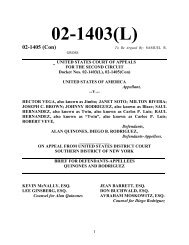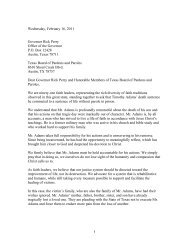Double Tragedies - Families for Human Rights
Double Tragedies - Families for Human Rights
Double Tragedies - Families for Human Rights
- No tags were found...
You also want an ePaper? Increase the reach of your titles
YUMPU automatically turns print PDFs into web optimized ePapers that Google loves.
ART LAFFIN’S brother, Paul Laffin, was stabbed to death in 1999 by a mentally ill homelessman, Dennis Soutar, as he was leaving the shelter in Hart<strong>for</strong>d, Connecticut where he had worked<strong>for</strong> ten years. Dennis Soutar was found mentally incompetent to stand trial and was committed tosixty years in a state mental hospital.“When it happens to you, it’s earthshattering,” says Art of the experience of losing a familymember to murder. “It took me to a place that I’d never been be<strong>for</strong>e, emotionally and spiritually.”Shortly after the murder, Art and his mother had the opportunity to meet with DennisSoutar’s sister-in-law and then, later, with his brother. Art describes the meeting with the sister-inlaw:“She was very, very nervous but very grateful that we were willing to meet with her. Shebegan to tell us about Dennis; we began to learn about his history. The family had made such an ef<strong>for</strong>tto try to be of help to him, driving around trying to find him. You could see the pain that they were going through.”Art recognizes that what happened to his brother is “not uncommon. It is a societal disgrace that some of the mentallyill homeless, who fall through the cracks and are not properly cared <strong>for</strong>, end up committing violent lethal acts.”Foreboding and helplessness are perhaps especiallyacute in those whose loved ones ended up committing violenceagainst someone in their own families. When JoeBruce describes his son William’s worsening illness and hisown growing fear <strong>for</strong> others, particularly <strong>for</strong> his wife,William’s mother Amy, the feeling is of listening to somewasliving with his wife Linda.We didn’t know ahead of time what shape he wasin. I knew something was wrong with Manny, butI didn’t realize there was this thing called PTSDand how it manifested itself. No one told us. All Iknew was that he was hyped up. He was so combativein his mind. It almost seemed like you couldsee his temper escalating. I noticed that he wouldget surly with people, and he was always talkingabout the war.Manny’s behavior continued to deteriorate over the nextweeks. Bill remembers that Manny complained about hearingvoices and had trouble sleeping. In late December, Billread in the newspaper that a 78-year-old woman namedLeah Schendel had died of a heart attack during an intrusioninto her home. When he found belongings with Leah Schendel’sinitials in the house among Manny’s things, he beganto suspect that Manny might have been responsible <strong>for</strong> thecrime. Horrified, he agonized about what to do. Part of himwas tempted to put Manny on a bus and just get him out ofthere. “As his older brother who loved him, I did think aboutthat option,” Bill recalls, “but if I did that, I’d have blood onmy hands too. I couldn’t live with that. I couldn’t live withthe risk that there was someone else out there who could becomea victim of my brother and his war demons.”Bill went to the police, told them what he suspected, andagreed to help lead them to Manny. He remembers vividlythat after they arrested Manny, an officer said to him,“You’re not going to go to the gas chamber or anything likethat.” But Manny was given an inexperienced attorney whohad never tried a death case, and jurors were presented withvery little in<strong>for</strong>mation about Manny’s history of mental illness.Bill remembers:They didn’t say much about the war during thetrial, how the war impacts mental conditions or anyconditions that might have existed prior. Two membersof the jury came out later, during the clemencyprocess, and said that if they had known Mannywas in such terrible psychiatric shape, they neverwould have voted <strong>for</strong> the death penalty. Butclemency was denied. The governor said thousandsof people have been through calamities and don’tmurder old ladies. In 1980, when Manny committedhis crime, people thought PTSD was hogwash, anexcuse. In 1999, when we were pleading <strong>for</strong>clemency, a lot more evidence about it had come outby then, but still it was a political thing.Ironically, Bill says, Manny’s condition stabilized inprison:In prison, he had a sergeant telling him what to doagain. Prison was a quasi-military situation withoutthe bombs coming in. On the streets, Mannyhad always needed somebody to take care of him.In prison, he would stand in the cell saying “Sir, yessir” to the warden. There’s my brother, the condemnedman, telling the person who’s going tostrap him down and kill him, “Sir, yes sir.” Mannynever left the war.Bill remains haunted by the paradoxical feeling that heboth did the right thing and did something that led to hisbrother’s execution. “For the rest of my life I have to livewith the fact that I turned my mentally ill brother in andthat led to his death,” he says now.__ 11 __


